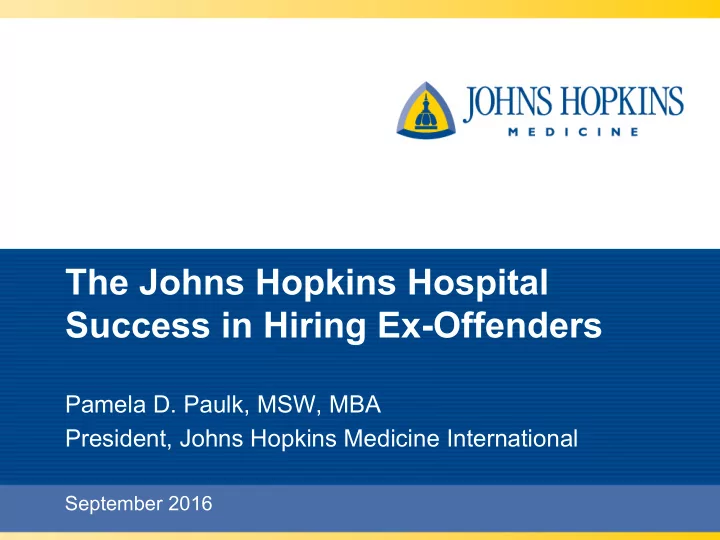

The Johns Hopkins Hospital Success in Hiring Ex-Offenders The Johns Hopkins Hospital Success in Hiring Ex-Offenders Pamela D. Paulk, MSW, MBA President, Johns Hopkins Medicine International September 2016
Johns Hopkins’ Bequest • $7M for a university and hospital in Baltimore • Largest philanthropic bequest in the country at that time (1867) • Explicitly expressed that it should serve the total needs of his beloved Baltimore community
Letter to the Trustees March 10, 1873 “The indigent sick of this city and its environs, without regard to sex, age, or color , who may require surgical or medical treatment, … and the poor of this city and state, of all races, who are stricken down by any casualty, shall be received into the hospital, without charge … . You will also provide for the reception of a limited number of patients who are able to make compensation… you will thus be enabled to afford to strangers, and to those of our people who have no friends or relatives to care for them in sickness … .”
Three-Pronged Approach to Workforce Development – Engage incumbent workers ; provide skills to move into jobs with higher wages – Excite youth to choose health care as a career; provide development opportunities – Hire from non-traditional sources; provide opportunities for those with a limited work history
Why Do We Do It? • Consistent with mission and culture • Decision to stay in East Baltimore, an at-risk neighborhood • Re-entering offenders with no job are more likely to return to crime • Jobs stabilize the community • Ex-offenders are great workers
How Do We Do It? • No “box” • Normal application / interview process • If chosen, criminal history reviewed • Review against Johns Hopkins’ Guidelines for Criminal Background Checks • Independent review by Security working with HR to ensure successful placement • If hired, background file kept in HR – manager notified only if needed • Coach assigned to support transition, when needed
The Johns Hopkins Hospital Guidelines for Criminal Background Checks To determine the relevance of an applicant’s criminal background, we examine the following: • Job and duties • Time, nature and number of convictions • Circumstances and relationship between convictions • Time between conviction and decision to hire • Employment before and after to see the extent of rehabilitation • Applicant’s attempts at rehabilitation • Age at time of conviction • Impact of conviction and relevance to security and safety of employees, patients and visitors • Whether the applicant disclosed this information
Now the EEOC Says It, Too • Categorical denial of an applicant because of a criminal record may be discriminatory • Must be a business rationale for the denial to hire an ex-offender
Unusual Referral Sources • East Baltimore Pipeline Readiness Training Curriculum – http://baltoworkforce.com.resouces.htm • Helping Up Mission (Homeless Shelter) • Catholic Charities’ Christopher Place (Homeless Shelter / Employment Program) • Marian House (Women’s Reentry Shelter) – Programs provide referrals and wrap-around services for residents – About 100 formerly homeless men work at Johns Hopkins
Screening Results • 100% background checks after offer – 60% hired – 19% ruled out for criminal background – 21% ruled out for other reasons – For over a decade annually • 5% of all hires have positive record • 20% of entry-level hires have positive record
Follow-up Studies • 5-year study of almost 500 ex-offenders hired showed a lower turnover for first 40 months vs. non-offenders • Close study of 79 with serious records followed for 3-6 years – 73 still employed at Johns Hopkins at end of study period – Only 1 involuntary termination • Anecdotal observation – no “problematic” terminations were ex-offenders • Longitudinal study being conducted now by outside research group
Success Factors 1. Have support of your security staff 2. Screen carefully for success 3. Help referrers build pre-hire curriculum to meet your specific needs 4. Interview candidates prior to training program as if you were hiring 5. Use internships as trial employment 6. Use job coaches to support transition
Our community members with criminal backgrounds have successfully joined our workforce. What can you do to add them to yours?
Recommend
More recommend